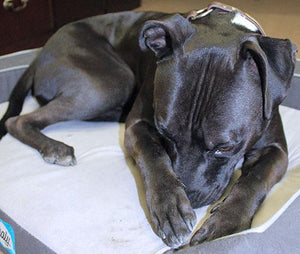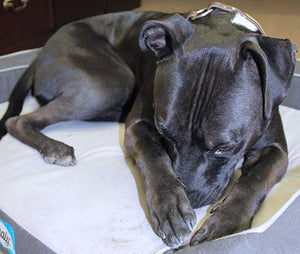Why Does My Dog Urinate Often and Indoors?
No pet owner wants their dog peeing inside the house. But why is your four-legged friend relieving themselves indoors? While it’s quite common for a puppy to have a couple of accidents in the home before they’re not fully housebroken, this behavior is problematic in older, house-trained dogs.
In this article, we’ll go over a couple of reasons why your dog might be urinating indoors, including:
- Health Concerns
- Behavioral Issues
- Environmental Changes

Health Concerns
The first step when your dog starts peeing often and inside the home is to rule out any health-related issues. Frequent urination and difficulty controlling it could be a sign of an underlying health issue.
Urinary Tract Infection: A UTI might be behind your dog’s frequent urination, making it difficult for them to get outside in time to wait for their evening walk to relieve themselves. This is among the most common causes of inappropriate urination in dogs.
Incontinence: One of the most common reasons for involuntary incontinence in dogs is old age (though it is possible for younger dogs to develop this issue). Oftentimes, this can be treated with medication or managed with pee pads around the home.
Diabetes: Diabetes can cause frequent urination in dogs. Some other signs to look out for are excessive water consumption, weight loss, cloudy eyes, or changes in appetite.
If you think your dog might be experiencing any of the problems above or another health-related issue, it’s essential to take them to the vet right away for an assessment and treatment options.

Behavioral Issues
If a house-trained dog with no identifiable health issues starts voluntarily urinating inside it could be a sign of a deeper behavioral issue arising. Catching and addressing this issue early on can prevent it from developing into a chronic problem.
Territorial Marking: A territorial dog might pee inside the house to mark their domain. This is especially common in male dogs, which is another reason why it’s so important to get your dog spayed or neutered. If the behavior continues after your dog is fixed, it might be worth hiring a professional trainer to work on their territorial behavior.
Submissive Behavior: On the other end of the spectrum, an overly submissive dog might urinate indoors often out of nervousness. Building up your dog’s confidence with socialization classes and frequent positive interaction with people of all ages can alleviate some of the nerves that might be causing them to urinate indoors.
Over-Excitement: Excitement is often reason enough for a dog to urinate inside. Often, this will present as just a few drops here and there when someone comes to the door or when your dog hears excitement in your voice. When you or anyone else walks through the front door, try to ignore your dog for a few minutes, speaking in a calm voice to avoid overstimulation.

Environmental Changes
Environmental changes are often an underlying factor when a dog starts urinating frequently indoors. We’ve detailed some common changes that could incite this behavior below.
Moving Homes: If you’ve just moved to a new home, your dog might start urinating inside as a way of marking it as their own. They might also smell any previous pets and mistake the new environment as a reasonable place to urinate. Introduce your dog to the new place by spreading their favorite beds, toys, and treats around for a sense of familiarity.
Adopting a New Pet: Adding another pet to the family can be a big change for the resident dog. They might want to send the message that this is their home, or they might be afraid of the new pet, causing them to urinate inside. Try introducing your dog to the new family member in a neutral outdoor space first to get them acclimated to one another.
Separation Anxiety: If your dog is urinating when you leave for work in the morning, they may be experiencing separation anxiety. Check out how to train a dog to stop scratching the door if they’re doing this as well when you leave the house.

Install a Pet Door
One of the best ways to manage frequent urination in dogs is to install a pet door. The Dragon Pet Door is an inexpensive yet well-made option for dog owners. A pet door allows your dog the freedom to come and go on their own terms to reduce indoor urination.
The Dragon Pet Door for Doors is a great option for dogs of all sizes. It’s available in a double flap option for harsher climates. In addition to the classic wall mount, the Dragon Pet Door for Sliders or Pet Door for Windows are great options as well.
We hope this helped explain what might be behind your dog’s frequent and indoor urination. Be sure to check out our tips for how to measure your dog for a brand new pet door.




